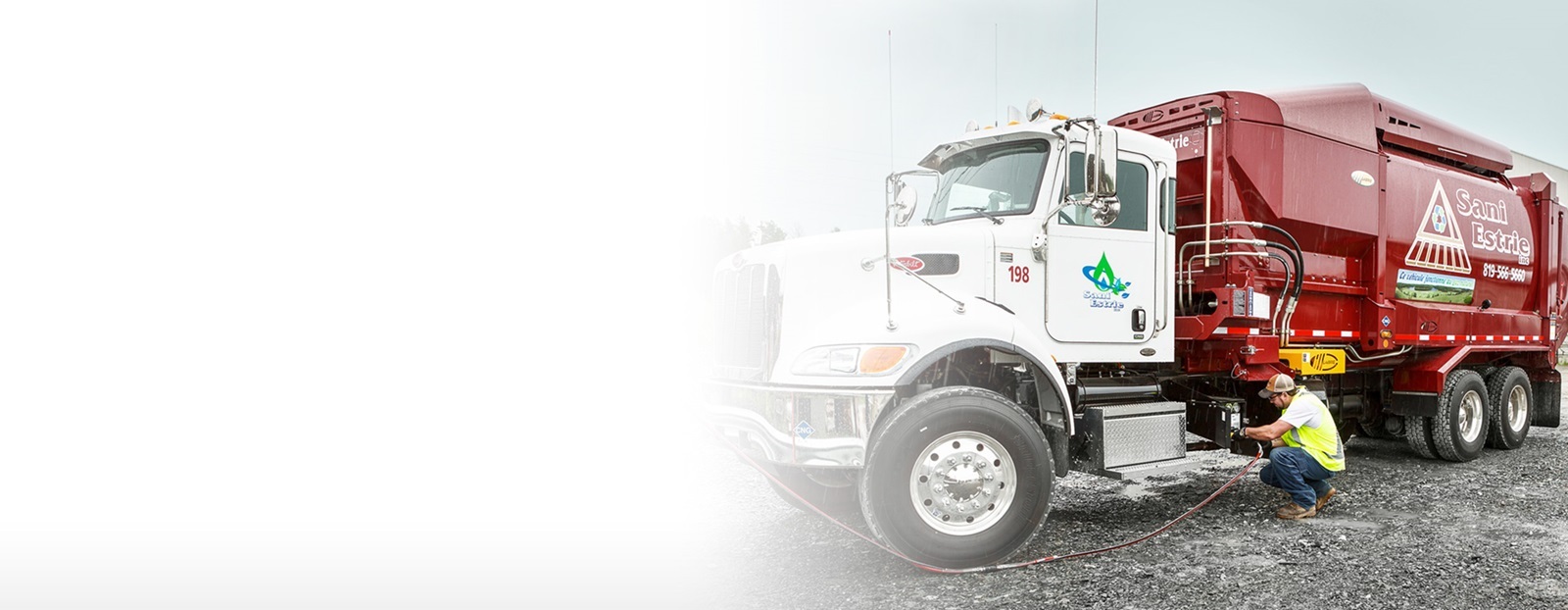Say goodbye to the downsides of diesel!
- Noise reduced by up to 10 decibels — when idling, 10 natural gas vehicles equal 1 diesel engine
- Reliable cold starts, even in mid-winter — The auto ignition temperature is 595° degrees with natural gas vs. 290° with diesel
- No need for urea injections or other complex systems to treat exhaust gases
- No bad odours in the cab, or on hands or clothing

Flawless record!
- The industry is governed by strict and exhaustive regulations.
- Carriers operate and fuel their vehicles worry free.
- Truck tanks are fitted with a safety valve that releases natural gas in case of overpressurization.
- Natural gas vehicles are safer than diesel vehicles in the event of an accident.
- Natural gas is not toxic.
- Natural gas is lighter than air so it dissipates quickly with no risk of soil or water contamination.
Vehicles
Refuelling station
Mechanical workshops
New natural gas vehicles are subject to Transport Canada safety regulations and Environment Canada emission standards. However, in the case of an existing vehicle that is converted to CNG or LNG, provincial regulations apply. In Quebec, conversions must comply with the Natural gas for vehicles installation code (CAN/CSA B109) and be supervised by a mechanic who holds a certificate of qualification (TCG) from Emploi-Québec. Converted vehicles are also subject to the Regulation respecting safety standards for road vehicles, including periodic inspections of the fuel system.
Compressed natural gas (CNG) stations must comply with the Compressed natural gas refuelling stations installation code (CAN/CSA-B108). Those offering liquefied natural gas (LNG) must follow the LNG production, storage and handling standard (CAN/CSA Z276-07). The initial start-up, maintenance, repair and dismantling of the stations must be supervised by a person who holds a TIRGNC or TIRLNG certificate from Emploi-Québec.
Indoor natural gas vehicle maintenance facilities are covered by the CSA standard CAN/CSA-B401, with recommendations on how to work safely. Your engineering consulting firm or ventilation contractor can apply the code when designing or modifying your indoor maintenance facilities.
Vehicles
New natural gas vehicles are subject to Transport Canada safety regulations and Environment Canada emission standards. However, in the case of an existing vehicle that is converted to CNG or LNG, provincial regulations apply. In Quebec, conversions must comply with the Natural gas for vehicles installation code (CAN/CSA B109) and be supervised by a mechanic who holds a certificate of qualification (TCG) from Emploi-Québec. Converted vehicles are also subject to the Regulation respecting safety standards for road vehicles, including periodic inspections of the fuel system.
Refuelling station
Compressed natural gas (CNG) stations must comply with the Compressed natural gas refuelling stations installation code (CAN/CSA-B108). Those offering liquefied natural gas (LNG) must follow the LNG production, storage and handling standard (CAN/CSA Z276-07). The initial start-up, maintenance, repair and dismantling of the stations must be supervised by a person who holds a TIRGNC or TIRLNG certificate from Emploi-Québec.
Mechanical workshops
Indoor natural gas vehicle maintenance facilities are covered by the CSA standard CAN/CSA-B401, with recommendations on how to work safely. Your engineering consulting firm or ventilation contractor can apply the code when designing or modifying your indoor maintenance facilities.
